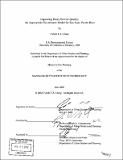Improving jitney service quality : an appropriate governance model for San Juan, Puerto Rico
Author(s)
Chang, Cybele T. Z. (Cybele Tsai Zin), 1973-
DownloadFull printable version (17.46Mb)
Other Contributors
Massachusetts Institute of Technology. Dept. of Urban Studies and Planning.
Advisor
Ralph A. Gakenheimer.
Terms of use
Metadata
Show full item recordAbstract
San Juan, Puerto Rico, like many North American cities, has turned to rail lines as a solution to the mounting traffic congestion threatening the urban environment. However, a rail system must rely on other transit modes to provide feeder services in order to expand its reach and broaden its customer base. This requires intermodal integration. The challenge facing the future success of Tren Urbano, the new rail system projected to open in the next two years, is the integration of the publicos. The publico is the owner operated jitney service indigenous to Puerto Rico that the government anticipates will offer crucial feeder services to Tren Urbano. For intermodal integration to succeed, publicos must offer comparable service quality. Unfortunately, the service quality of publico transit is poor as a consequence of the long-term decline of the publico industry. Therefore, the goal of the government is to improve publico service quality so it is comparable with the rest of the transit system, while recognizing the unique owner operator quality of the industry. This thesis examines four different jitney systems in North America. The study documents the development of the jitney service, how different cities govern jitney operators, and what affect the governance structure has on the quality of service. The purpose of this study is to determine what kind of governance structure leads to a high quality of jitney service. The study also examines what other factors contribute to high quality service. The ultimate goal is to apply the findings to San Juan, Puerto Rico in order to define future publico reforms. The case studies illustrate that North American jitney services all rely on hybrid governance models, consisting of government controls and self-regulating mechanisms. The study suggests that a hybrid governance structure that is based on cooperation between operators and government regulators leads to superior service quality. However, service quality is not merely a function of governance structure. Service quality also depends on the profitability of the jitney service, institutional strength, and the context of the industry. In a highly profitable setting, industry actors will spontaneously mobilize and provide a high quality of service. Consequently, the recommendations from this study examine ways of improving the profitability of the publico industry in order to improve the quality of service. In an unprofitable environment, the government must take the lead in developing other strategies to encourage service quality improvements. The recommendations in this study also suggests that the government proactively assist the publico industry improve service quality though various institutional and governance strategies.
Description
Thesis (M.C.P.)--Massachusetts Institute of Technology, Dept. of Urban Studies and Planning, 2002. Includes bibliographical references (p. 154-160).
Date issued
2002Department
Massachusetts Institute of Technology. Department of Urban Studies and PlanningPublisher
Massachusetts Institute of Technology
Keywords
Urban Studies and Planning.